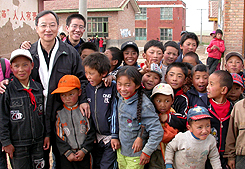October 2, 2007 - By Mitzi Baker

Sam So, MD, visited with school children in China at Hainan Zhou, a district south of Qinghai Lake where 60 percent of the population is Tibetan, last year before the vaccination program started. He is wearing a white Tibetan ceremonial scarf called a 'Khata' that symbolizes goodwill and compassion.
Driven by the quest to eradicate a disease more infectious than AIDS and many times more prevalent worldwide, Samuel So, MD, has gone to one of the most remote parts of China.
He has already spent most of his career as a liver cancer and transplant specialist at School of Medicine dedicated to eliminating this foe - hepatitis B. In his most ambitious effort yet, he has launched a campaign in a distant corner of China this fall, partnering with public health professionals and the government to vaccinate half a million children against the virus. So was in the northwest province of Qinghai in early September to watch the first group of school children get vaccinated.
"Hepatitis B and the liver cancer it causes is one of the most serious health problems in the world and it has been seriously neglected," said So, the Lui Hac Minh Professor of surgery at the School of Medicine. About 1 million people die each year - or one in four of those chronically infected with hepatitis B - from the damage that the virus inflicts on the liver.
So founded the Asian Liver Center at Stanford in 1996 to address the huge numbers of Asians grappling with chronic hepatitis B infections. In the last decade, the Asian Liver Center has managed to educate, vaccinate and treat thousands of vulnerable people in the San Francisco Bay Area and nationwide.
More than 60 percent of those found infected in the United States have come from Asia. One out of every 250 people in the United States have chronic hepatitis B infection, but in China, for example, the rate is one in 10, so 120 million are chronically infected there. "This staggering number is approximately the population of Great Britain and France combined," So pointed out, and that means 30 to 40 million Chinese will eventually die from liver cancer or liver disease linked to hepatitis B.
In the last few years, So has taken his efforts to the source, reaching out to Asian countries, including the Philippines and China. So started the Jade Ribbon Campaign, initially launched in San Francisco, as the banner under which people in the United States and worldwide can unite against hepatitis B. With the support of donations from philanthropists and non-profit foundations in the United States and Asia, the Jade Ribbon Campaign has facilitated the vaccination of more than 150,000 children abroad.
"To me it is so sad that we've had a vaccine against this virus for 21 years," So said. "China has only been giving free hepatitis B vaccines to newborns since 2003, and many children who are five years of age or older may not be vaccinated." That has left tens to hundreds of millions of susceptible people unvaccinated.
The United States has been vaccinating newborns for the last 18 years.
Vaccinating children as young as possible is critical, said So, because the younger someone becomes infected, the more likely it is to lead to a long-term chronic infection that wreaks havoc on the liver. Ninety percent of newborns exposed become chronically infected, compared with six percent of adults.
A common way that hepatitis B is transmitted is from an infected mother to her baby at birth. But even if children dodge that bullet, they can become infected throughout their lives through direct contact with blood, such as unsafe medical injections, or even from sharing toothbrushes or razors contaminated with blood. They can also get it from unprotected sex.
In 2006, So began a pilot project in the Qinghai province of China, where they vaccinated 56,000 children in one district against hepatitis B. This region lies in the very remote, far northwestern part of the country, next to Tibet. The region is woefully underserved by medical personnel, So said.
His group was the first in China to provide hepatitis B vaccination free for kids 13 and under and the only program allowed to come into the schools directly. "The pilot program was so successful that the government approached us to do it for the entire province, which is about the size of Texas," So said.
In the massive program launched this fall, the Asian Liver Center helps provide the faculty, training, staff, educational materials, and vaccines to the entire province. The Chinese government provided two-thirds of the $3 million funding and the rest was covered by a gift from the Ping and Amy Chao Family Foundation in the United States.
In addition to the vaccination program - which requires three shots over the course of six months - the Jade Ribbon Campaign emphasizes education. Cartoon posters on the walls illustrate how the virus inflicts damage and how the shots prevent that. Calendars that go home to the parents contain messages conveying the importance of being tested and then treated or vaccinated. Kids proudly sport teal-colored rubber bracelets that say "LIVERight" that they receive after their shots.
'It's a no-brainer,' So said. 'If we could vaccinate everyone, in 10 years we could have no new infections - it's just so simple.'
About Stanford Medicine
Stanford Medicine is an integrated academic health system comprising the Stanford School of Medicine and adult and pediatric health care delivery systems. Together, they harness the full potential of biomedicine through collaborative research, education and clinical care for patients. For more information, please visit med.stanford.edu.